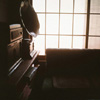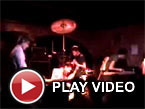Fjordne, "The Setting Sun"
 Fjordne’s fourth album is a warm and evocative plunge into glitchy, immersive ambiance that is (very) loosely inspired by Dazai Osamu’s novel of the same name. While certainly reminiscent of artists like Chihei Hatakeyama in tone, the density, invention, and experimentation on display here make The Setting Sun rather a unique and beguiling entity.
Fjordne’s fourth album is a warm and evocative plunge into glitchy, immersive ambiance that is (very) loosely inspired by Dazai Osamu’s novel of the same name. While certainly reminiscent of artists like Chihei Hatakeyama in tone, the density, invention, and experimentation on display here make The Setting Sun rather a unique and beguiling entity.
Fjordne is the solo project of Tokyo’s Shinichiro Fujimoto, who is also a member of Starke. While still quite young (he is under 30), he has taken his music to some rather avant-garde places with The Setting Sun. He remains little known outside of Europe and Asia, but his previous three releases contained some rather impressive and well-regarded forays into dreamy electronic ambiance. His early work betrayed little hint of the neo-classical leanings to come, however. I suspect he has been listening to some Phill Niblock, Charlemagne Palestine, or LaMonte Young as of late, but there is no indication of any direct or clumsy imitation.
While Fujimoto certainly has not abandoned his love of reverb, he has shifted his vision into much more organic territory. The primary instruments on The Setting Sun are pianos, strings, and acoustic guitars (though they are often heavily treated). More importantly, however, is what Fjordne does with them: most of the material on this album constitutes a prolonged and gutsy high-wire act in which Shinichiro manages to completely avoid any melodic movement or progression while still maintaining enough vibrancy to keep listeners mesmerized. The are a few instances where lazily repeating chord progressions appear, such as on “Trees See All,” but they merely cycle endlessly and gently and avoid any escalation. Most of the time, sounds inventively quiver, burble, skip, drift, and harmonize around a single central chord (the opening “Collide” is an especially excellent example of this).
Of course, none of that ambition would matter if this album wasn’t good, and it happens to be stunningly beautiful. Fujimoto’s floating, fractured haze of skipping loops, backwards pianos, and guest vocalist Fuyu’s wordless atmospherics evokes a bittersweet and sun-dappled heaven. Also, the gentleness and subtlety with which he weaves the innumerable tracks together is quite deft and entrancing. It is difficult to find fault with anything on the album, but the strongest pieces seem to be those in which some sounds are sharp enough to cut through the blissed-out, amorphous fog and rouse me from the pleasantly narcotizing effects of the reverb (such as the field recordings of birds in “After You” or the acoustic guitars and lazy, shuffling beats in “Torn Out” and “Last Sun”).
I imagine listening to The Setting Sun while driving would probably cause me to plow into a truck or something, due to its hypnotically static and edgeless nature, but it is the perfect soundtrack for late year hibernation. Notably, Kitchen’s packaging of this album is nearly as impressive as the music itself, as the CD is housed in a six-fold accordion photo album featuring mysterious, nostalgia-soaked art by label-mate aspidistrafly’s April Lee.
samples:



